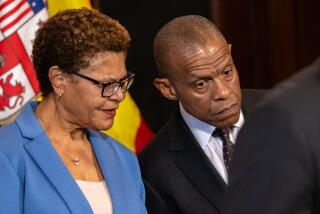MOVE’s Violent Past Told at Inquiry Into Police Siege
- Share via
PHILADELPHIA — A citizen’s fact-finding commission Tuesday opened its long-awaited public inquiry into the fiery police confrontation with the radical group MOVE to high expectations, loud protests and light attendance.
Calling the May 13 police siege and the fire that followed it “one of the most devastating days in the modern history of this city,” Chairman William H. Brown III said the 11-member panel hopes to “begin healing the wounds” during four weeks of televised hearings.
The opening testimony by three police officers and three MOVE neighbors focused on the city’s turbulent and often violent 12-year history with the militant “back-to-nature” group.
Threats, Assaults Told
One neighbor, Carie Foskey, grew emotional as she detailed how MOVE members had cursed and threatened her for days over loudspeakers, and had assaulted her neighbors. She said that MOVE members tried to attract animals by placing raw meat and garbage behind their Osage Avenue row house in west Philadelphia.
“One day I went out to hang up clothes and maggots fell on my hair,” said Foskey, beginning to cry. Her husband, Nathan, clutched her hand.
The growing complaints from neighbors and a number of outstanding criminal warrants led police to assault the barricaded MOVE house on May 13. After an early morning gun battle and daylong siege, police dropped a bomb on the roof, starting a fire that gutted 61 homes. Seven adults and four children died in the MOVE house.
Police civil affairs officer John Cresci testified that MOVE members had been arrested about 240 times before Aug. 8, 1978, when a police blockade against another MOVE house ended in a gun battle that killed one officer and wounded at least four firefighters. Eleven MOVE members were later convicted on murder and assault charges.
Gavel-to-Gavel Coverage
Only about 60 people attended the opening session of the Philadelphia Special Investigation Commission in a cavernous 650-seat auditorium at public television station WHYY. The station is broadcasting gavel-to-gavel coverage.
Protesters disrupted the morning session twice by suddenly standing in the balcony and shouting “Indict the murderers” and “Lies, lies” at the surprised panel members below.
Police led about eight demonstrators off, and no arrests were made. Dozens of police patrolled the building and metal detectors were used at every entrance.
The commission, which was appointed by Mayor W. Wilson Goode, was also attacked by the Fraternal Order of Police Lodge 5, which represents the city’s 7,000 uniformed officers. It had twice unsuccessfully sued to derail the hearings, contending that the city is looking for police scapegoats. On Monday, the Pennsylvania Supreme Court rejected the appeal, and FOP lawyers said that they would try to appeal to the U.S. Supreme Court this week.
‘It’s Goode’s Commission’
“It’s a fix,” charged FOP lawyer Anthony J. Molloy Jr. “It’s Goode’s commission. He appointed it. It’s like the French Army during World War I. Lose a battle so hang a sergeant, shoot a captain. That’s what’s happening here. We’re not going to let it happen.”
Mayor Goode, whose handling of the crisis is a key area of the inquiry, is expected to testify by next week. An aide said Goode watched part of the session in his City Hall office.
In his opening statement, Brown recited a litany of more than 60 questions he said that the commission would try to answer, including “What did the mayor do and when did he do it?”
“Careers and reputations will be at stake,” said Brown, a Philadelphia lawyer who is a former chairman of the Federal Equal Employment Opportunity Commission.
Brown said that the panel’s six investigators already had interviewed “upwards of 600 people.” About 50 to 75 are expected to testify in the public hearings, a spokesman said.
More to Read
Sign up for Essential California
The most important California stories and recommendations in your inbox every morning.
You may occasionally receive promotional content from the Los Angeles Times.











